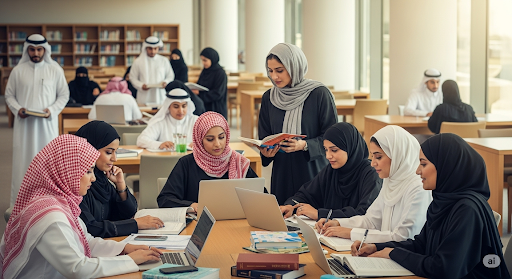
Saudi Arabia has achieved a significant increase in female labor-force participation, surpassing the targets set by Vision 2030. The adoption of digital payments and the rise in female entrepreneurship, supported by legal reforms, have been key drivers of this transformation. Challenges still exist in areas like leadership representation and wage equality, yet the country’s advancement signifies a notable societal shift towards inclusivity and a knowledge-based economy. Female labor-force participation has surged from around 17% in 2015 to 36.2% in Q3 2024, surpassing the initial 30% goal set by Vision 2030. The ‘Mada’ digital payment platform has played a crucial role in this progress, with e-commerce sales reaching SAR 197.4 billion in 2024. Women now lead 45% of small and medium enterprises (SMEs) in Saudi Arabia, benefitting from legal reforms promoting equal pay, anti-harassment measures, and extended parental leave. Despite advancements, disparities in board-level positions, societal norms, and wage gaps remain. While projects like NEOM, Qiddiya, and the Red Sea Project grab headlines, a significant shift is happening within Saudi society as women enter traditionally male-dominated professions, embrace digital advancements, and drive small business growth, marking a profound transformation. The country aims to increase female labor-force participation to 40% by 2030, building on the current progress and reflecting evolving societal norms. The empowerment of women in the private sector, highlighted by the leadership of women in nearly half of SMEs, is underpinned by legal reforms that ensure fair pay, protect against harassment, and support work-life balance. The ‘Mada’ payments network has processed SAR 197.4 billion worth of e-commerce transactions in 2024, a 25.8% increase from the previous year. This financial modernization has enabled contactless payments and reduced dependence on cash, contributing to women’s economic independence. Saudi women now represent over 52% of university enrolment, showcasing their growing presence in higher education. Vocational training programs accessible to women are equipping them with practical skills for the workplace, contributing to their professional development. While progress has been made, women still face underrepresentation in executive and board positions, compounded by societal attitudes and wage discrepancies. The country’s non-oil GDP now constitutes 52% of total output, with declining unemployment rates among citizens and increased female earnings supporting household incomes and economic stability. Beyond the ambitious projects outlined in Vision 2030, Saudi Arabia is undergoing a profound social evolution catalyzed by the advancement of women and the embrace of digital innovations. The country’s transition towards a knowledge-based economy, driven by increased labor participation, financial technology adoption, entrepreneurial ventures led by women, and a focus on education, signals a shift towards long-term economic sustainability. For lasting change, greater female representation in leadership roles, continued workplace protections, and cultural integration are essential. If current momentum is sustained, Saudi Arabia stands to not only meet but exceed its social objectives, establishing these reforms as transformative legacies far beyond physical megaprojects.






